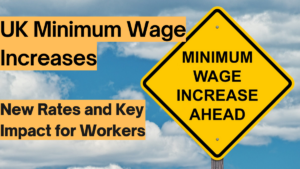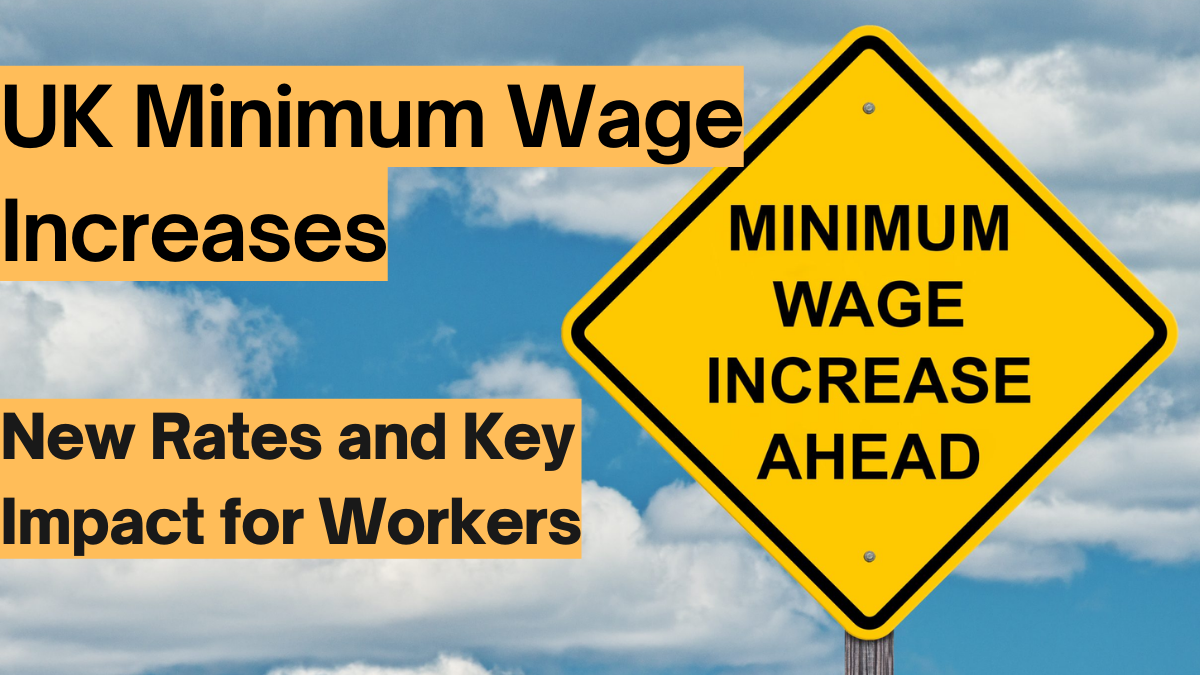The UK government has recently announced significant changes to the national minimum wage, a move that is set to impact millions of workers across the country. The updated rates are part of the government’s ongoing efforts to ensure fair pay and reduce income inequality, while also addressing the rising cost of living. In this article, we’ll break down the details of the minimum wage changes, who will be affected, and how it will impact workers in various sectors.

What Are the New Minimum Wage Rates?
The UK government adjusts the national minimum wage annually to reflect economic conditions, inflation, and living costs. As of the latest updates, the minimum wage rates have been raised to provide better financial support for workers, particularly those in low-paid jobs.
- National Living Wage (for 23 and over): The National Living Wage has seen a notable increase, setting the pay floor higher for workers over the age of 23.
- National Minimum Wage (under 23): The minimum wage for workers aged 21-22 and under 21 has also been raised to ensure fair compensation.
- Apprenticeship Wage: The rate for apprentices has been adjusted to reflect their growing contributions to the workforce, ensuring fair pay for young people learning on the job.
MUST READ: Renewed Push to Raise Basic State Pension to £221: Key Details
New Minimum Wage Rates:
| Age Group | Previous Rate | New Rate (2025) |
|---|---|---|
| 23 and over | £9.50 | £10.50 |
| 21-22 | £8.36 | £9.18 |
| 18-20 | £6.56 | £7.00 |
| Under 18 | £4.62 | £4.80 |
| Apprentices | £4.30 | £5.30 |
Who Will Be Affected by the Minimum Wage Changes?
The new minimum wage changes will affect workers in various sectors, especially those earning the minimum wage or near it. Here’s a closer look at the groups that will benefit the most from these increases:
- Young Workers: Those aged between 18 and 22 will see the most significant percentage increases, bringing their wages more in line with the cost of living.
- Low-Paid Sectors: Industries such as retail, hospitality, and healthcare, where minimum wage workers are common, will see widespread benefit from these increases.
- Apprentices: Young workers who are undergoing training and apprenticeships will also experience a boost, which could help attract more individuals to vocational training programs.
Why Are the Minimum Wage Changes Important?
These changes are designed to address a number of economic factors:
- Rising Cost of Living: The cost of living in the UK has been steadily increasing, particularly in terms of housing and utilities. The government has raised the minimum wage to ensure workers can keep up with these costs.
- Fair Pay for Workers: The aim is to provide workers with a fairer wage for their work, ensuring that the minimum wage offers a living wage, not just a basic one.
- Economic Growth and Stability: Raising the minimum wage can stimulate economic activity. Higher wages lead to increased disposable income, which, in turn, drives demand in local markets and boosts overall economic growth.
Key Benefits of the Minimum Wage Changes
| Benefit | Description |
|---|---|
| Improved Standard of Living | Higher wages help workers meet daily expenses and improve quality of life. |
| Economic Boost | Increased wages lead to higher consumer spending, benefiting businesses and the economy. |
| Reduction of Poverty | Raising the minimum wage helps reduce income inequality and poverty rates. |
How the Minimum Wage Changes Will Impact Employers
While these wage increases will benefit workers, employers may face challenges as a result of the higher pay levels. Here are some considerations for businesses:
- Increased Payroll Costs: Employers will need to adjust their payroll to accommodate the higher wage levels, which could affect profit margins, especially for small businesses.
- Pressure on Profitability: In sectors where profit margins are already tight, businesses may need to find ways to balance increased labor costs with the need to stay competitive.
- Incentive to Improve Productivity: The wage increases may prompt businesses to improve efficiency and productivity to offset the higher costs.
What Employers Need to Do
- Review Payroll Systems: Employers should ensure their payroll systems are updated to reflect the new wage rates, including any adjustments for overtime, bonuses, or other allowances.
- Communicate with Employees: Businesses should inform their staff about the changes and ensure they understand how the new wage rates affect their pay.
- Evaluate Business Strategy: Employers may need to reevaluate their business strategies to account for the increased labor costs, which could involve cost-saving measures or increasing prices.
Conclusion
The recent changes to the UK minimum wage are a positive step toward ensuring that workers receive fair compensation for their efforts, especially in light of the rising cost of living. With increased pay for workers across various age groups and sectors, the government’s decision aims to promote economic stability, reduce poverty, and provide better financial security for low-paid workers. However, businesses will need to adapt to these changes, which may involve balancing payroll increases with the need to maintain profitability. Ultimately, these adjustments signal the government’s commitment to improving the standard of living for all workers in the UK.
People May Ask
1. When will the new minimum wage rates take effect?
The new minimum wage rates are expectedto take effect from April 2025.
2. Will all workers get the same percentage increase?
No, the percentage increase varies depending on the worker’s age and the previous minimum wage rate they were earning. Younger workers and apprentices generally see the largest percentage increases.
3. How often does the UK minimum wage change?
The UK minimum wage is reviewed annually, with changes typically announced in the government’s Budget or Autumn Statement.
4. Will businesses be affected by the minimum wage changes?
Yes, businesses will experience increased payroll costs, especially in sectors that rely heavily on minimum wage workers. Employers will need to adjust their budgets and operations accordingly.
5. Can employers pay less than the new minimum wage rate?
No, employers are legally required to pay at least the national minimum wage for all eligible workers. Failure to comply with minimum wage laws can result in fines and legal penalties.
Pari is a passionate writer known for captivating stories that blend imagination and reality. Inspired by travel, history, and everyday moments, Pari crafts narratives that resonate deeply with readers.
